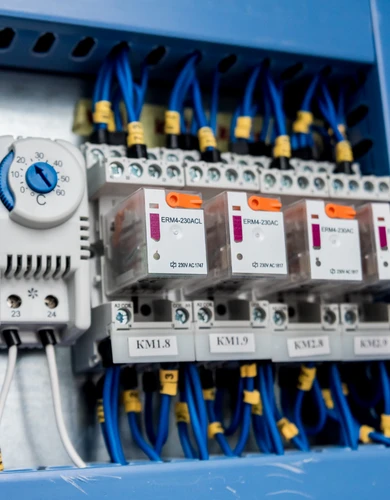Business Gas Meter
Business gas meters are used in Britain to measure gas consumption at commercial properties.
All commercial properties with an active gas supply have a business gas meter. Gas meter readings are used to calculate charges on a business gas bill.
This guide explores the different types of business gas meters used in Britain and answers common questions about their installation, maintenance, and removal.
The different types of business gas meters
A gas meter measures the volume of gas that flows from the gas mains through the meter and into a commercial property.
Most commercial properties in the UK use diaphragm gas meters, which use a flexible internal membrane to measure the pressure of gas passing through them.
💡Here’s a helpful video if you’re interested in the moving parts inside your gas meter.
Here are the most common types of business gas meters used by small businesses in Britain:
Imperial business gas meter
An imperial business gas meter measures gas consumption in cubic feet. The display usually has four digits followed by “ft³”.
The digits on the front of the meter can either be rotating analogue dials or a digital display.
Metric business gas meter
A metric business gas meter measures gas consumption in cubic metres. The display of a metric business gas meter usually shows five digits followed by decimal points and “m³”.
The digits on the front can either be rotating analogue dials or a digital display.
Smart business gas meter
A smart business gas meter has a digital display and automatically communicates meter readings with your business gas supplier.
The main advantage of a smart gas meter is that you don’t have to manually submit meter readings to receive accurate business gas bills.
Different sizes and capacities for various business needs
The size of a business gas meter is typically determined by the maximum planned demand for gas, known as the flow rate. The flow rate for a typical UK household is 30 kW.
Here are the seven most common sizes of business gas meters:
| Meter Type: Low Pressure (Diaphragm Meters) | Flow Rate kW (kilowatts | Capacity (SCMH) Standard cubic metres per | Capacity (SCFH) Standard cubic feet per hour |
|---|---|---|---|
| U6 | 0 – 65 kW | 6 m³/hr | 212 ft³/hr |
| U16 | 66 – 173 kW | 16 m³/hr | 565 ft³/hr |
| U25 | 174 - 271 kW | 25 m³/hr | 883 ft³/hr |
| U40 | 272 - 430 kW | 40 m³/hr | 1,412 ft³/hr |
| U65 | 343 – 704 kW | 65 m³/hr | 2,296 ft³/hr |
| U100 | 705 – 1,083 kW | 100 m³/hr | 3,511 ft³/hr |
| U160 | 1,084 – 1,733 kW | 160 m³/hr | 5,650 ft³/hr |
Source: Gasconnections.co.uk
💡 The size of your business gas meter directly impacts the business gas standing charge in your business gas rates; the bigger the meter, the higher the charge.
What is a business gas meter ID?
A meter ID, or meter serial number, is a unique identifier associated with a physical gas meter. If your gas meter is replaced or upgraded, your gas meter ID will change.
Most business gas meters will have a meter ID displayed on them. This will also be shown on your business gas bill.
Does my business gas meter have my MPRN number on it?
No, your business gas meter will typically not display an MPRN number. The MPRN is associated with a particular address that is connected to the local gas distribution network rather than a specific gas meter.
💡 A business gas bill will typically display both your Meter ID and MPRN.
Business gas meter installation
Gas meter installations at commercial properties are a complex process requiring certified engineers and involving several parties.
In this section, we’ll cover cases where a business gas meter installation is needed and how to arrange this process.
Does your business need a new gas meter?
There are a few scenarios where a business gas meter installation is required. Here are the most common:
- You’re refitting a property and need to move the location of the gas meter.
- You need to upgrade or downgrade the size of your business gas meter.
- Your business gas meter is not working and needs to be replaced.
💡If your commercial property isn’t yet connected to the grid, visit our guide to new business gas connections.
How to arrange a business gas meter installation?
Safety is paramount when installing a gas meter. We recommend engaging a certified business utility consultancy that can manage each stage of the gas meter installation process.
To arrange a business gas meter installation, here’s the information you will need:
- Site address
- Company registration information.
- MPRN number
- Peak hourly gas demand in kWh (to determine the size of your gas meter)
- Proposed meter location (internal or external)
The process of installing your business gas meter
The process of installing a business gas meter requires the work of a qualified gas engineer. Here, we’ll outline the process for a simple small business gas meter installation.
- Initial site visit: An engineer will usually conduct an initial site visit to determine the scope of the work required and then agree on a later date for the installation.
- Supply isolation and meter installation: On the day of the installation, your business gas supply will be isolated, and your new meter will be installed and connected to the gas mains.
- Reinstating gas supply: Your business gas supply will be gradually reinstated while your engineer uses a manometer to check for leaks.
- Functionality and calibration check: Finally, your engineer will perform a functionality and calibration check on your business gas meter to ensure it works as expected.
Business gas meter problems and maintenance
Business gas meters are very reliable, and maintenance problems are rare. Your business energy supplier will send someone out to inspect and conduct a physical gas meter reading once every few years.
If you suspect there is a measurement problem with your gas meter, we recommend contacting your supplier.
You can also request a free upgrade to a smart gas meter as part of the national rollout.
💡If you smell gas or suspect a leak, call the National Gas Emergency Service on 0800 111 999 immediately.
Removing a business gas meter
As the UK transitions to net zero, more commercial properties are upgrading to heat pumps that use electricity instead of gas.
If you no longer need a business gas supply, it’s beneficial to remove your business gas meter and disconnect from the local gas grid/independent gas transporter.
If you have a business gas meter, you’ll still be paying gas standing charges, regardless of whether your property is consuming any gas.
A qualified gas engineer can remove the gas meter and disconnect the gas pipework from the mains.

